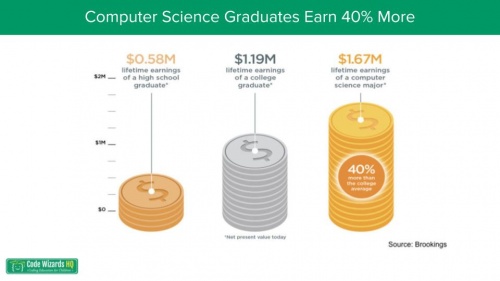Computer Science Career
The job market for Computer Science (CS) graduates is exploding all over the world due to the critical shortage of software developers. The computer field is expanding in so many directions beyond any prediction. New areas and new fields are created every year adding to the urgent needs. There are jobs that did not even exist five years ago such as mobile developers, network security administrator, social network analyst and social network developers etc. but today they are in high demand. According to an industry report, there are three jobs available for every CS graduate. A software manager told reporters: “Few years ago, we were very selective on who we want to hire. Today if we do not hire fast enough, somebody will. Competition for CS graduates is fierce. We even offer jobs to third-year students to prevent them for working for other company.”
Reports of available CS job openings are staggering. A 2011 study claimed a shortfall of 150,000 unfilled positions in the U.S alone. The report estimated that the world will needs about 4.5 million software developers to meet global demands in 2020. The reason is technology changes so fast that no schools can train enough students to meet demand. Although many jobs can be filled by retrained IT people but there are not enough qualified trainers to train them. Technology cities like San Jose, San Francisco, Boston, Seattle, and Austin have over 8000 companies hiring IT workers “like crazy." If you are still not sure what to study in college, you may want to look at Computer Science as your future career.
Today every industry relies on information technology. During the financial crisis, companies stopped hiring and waited until the economy recovers so many works were not done. As the recovery begins they cannot wait longer and suddenly every company is hiring at once which create a surge in demand. Since every business needs new software to improve their efficiency, IT becomes the fastest growing area. At the same time, the market for mobile platforms and tablets took off and put more demand for skilled software developers. One development area leads to another, creating new needs for more software workers. As industries see the benefits of new software technologies, they must ensure their systems are using the latest technologies too so they prefer to hire newly graduates because their IT people may not have the latest skills.
The introduction of smart phone creates a need for integrate computing and telecommunications because phone is now a computers too. As a result, systems integration and software architect are becoming “Hot skills”. With such high demand, most CS graduates do not have to find jobs because the jobs have to find them. Today CS graduates often have several companies to choose from with very competitive salary. A newly CS graduate can make $90,000 to $110,000 a year depending on the school they graduated from. Students from universities that have training programs in alignment with industry needs often make more.
As technology changes, demand in industry also changes that requires university to change their curriculum too. Today there are relevant emerging trends in Computer Science that students need to pay attention:
The amount of malicious software in the form of viruses, worms, etc is causing concerns to the extent that it is now seen as a major threat to the industry. The IT industry has sent urgent requests to all universities that they must pay attention to security matters and “Computing Security” must be a required course for all IT graduates. Although the issues of security is often taught in the “Fundamental to Software Engineering” or “Introduction to Computer Science” courses by mentioning the use of passwords, access controls, the use of firewalls, using cryptographic techniques, data security. However, many violations come about through inadequate attention to basic matters such as programming techniques. Failure to program properly can result in exploitable software defects such as buffer overflow and related problems. In addition web-related security breaches are increasingly common, and again need to be addressed appropriately. The IT industry recommends that “Computing Security” courses and “Secure Coding” courses to be taught for all Computer Science and Software Engineering training program in university.
The development of multi-core processors has been a significant contribution to computing architecture. To take this new advantage fully, training needs to apply concurrency into their programming courses. This places greater emphasis on the principles, techniques and technologies of concurrency in the fundamental logic and programming courses. With the explosion of mobile platforms and tablets, there are urgent needs to update current training to include concurrent features, and with emphasis on the concurrency elements. Such a request from IT industry represents a fundamental shift towards greater attention to concurrency as the future of all computing curriculum requirements.
The use of the web is another major change in computing disciplines. The IT industry also requests that university to require CS students to build knowledge in areas that address programming, software engineering, data management, mobility, human computer interaction, security and intelligent systems. Web engineering has now emerged as a new discipline of CS, and web science is emerging quickly too. These developments have served to blur the traditional distinction between the areas of operating systems and networking / communications. Other topics such as games computing or entertainment computing, as well as simulation and modeling tend to emerge quickly as another new CS disciplines.
For many years, Computer Science is an area that focuses on data structure, logic, algorithms, and programming languages but it is rapidly changing with new emerging areas that requires significant change in the way university educate their students. As new areas are needed by the industry, as new technology is evolving, CS students need to understand these changes to keep their knowledge and skills up to date with high demand from industry.
Sources
- Blogs of Prof. John Vu, Carnegie Mellon University
